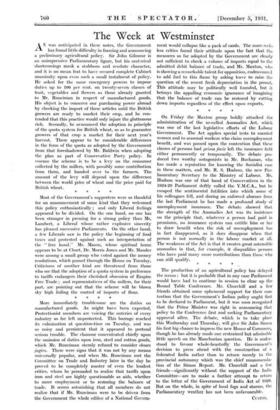More immediately troublesome are the duties on manufactured goods. As
might have been expected, Protectionist members are voicing the outcries of every industry so far left unprotected. This barrage reached its culmination at question-time on Tuesday, and was so noisy and persistent that it appeared to portend serious trouble. The clamour concentrated chiefly upon the omission of duties upon iron, steel and cotton goods, which Mr. Runciman sternly refused to consider chases jugees. There were signs that it was not by any means universally popular, and when Mr. Runciman met the Committee on Trade and Industry later in the day he proved to be completely master of even the loudest critics, whom he persuaded to realize that tariffs upon iron and steel are highly questionable as aids, whether to more employment or to restoring the balance of trade. It seems astonishing that all members do not realize that if Mr. Runciman were to be driven from the Government the whole edifice of a National Govein- ment would collapse like a pack of cards. The more reek. less critics found their attitude upon the fact that the measures so far adopted by the Government are clearly not sufficient to check a volume of imports equal to the admitted debit balance or. trade, and Mr. Maxton, who is showing a remarkable talent for opposition, endeavoured to add fuel to this. flame by asking leave to raise the question of the recent fresh depreciation in the pound. This attitude may be politically well founded, but it betrays the appalling economic ignorance of imagining that the balance of trade can be restored by cutting down imports regardless of the effect upon exports.










































 Previous page
Previous page